
University of Waterloo honours top co-op students
Waterloo co-op students worked on everything from prostate cancer research to the theoretical physics behind black holes

Waterloo co-op students worked on everything from prostate cancer research to the theoretical physics behind black holes
By Staff Co-operative Education & Career ActionA student who designed a study that showed a prostate cancer centre reduced by two months the time from suspicion of cancer to treatment, is among six outstanding co-op students that the University of Waterloo will honour as part of National Co-op Week.
One co-op student from each of the University's six faculties will receive the 2013 University of Waterloo Co-op Student of the Year Award. The honour is as a result of exemplary performance during a 2013 work term and other factors, including community involvement, contribution to co-op, and academic achievement.
"Experiential education is a cornerstone at Waterloo--it's in our DNA," said Peggy Jarvie, executive director of Co-operative Education and Career Action at Waterloo. "The achievements of these extraordinary students illustrate the kind of high-quality work terms that our co-op students experience.”
Josh Bradshaw (Faculty of Engineering, Systems Design)
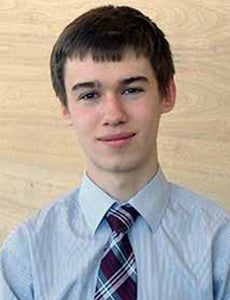 Josh Bradshaw worked as a web developer at Watrhub for his first work term. On his own initiative, Josh identified and then addressed some small issues with Watrhub’s process, increasing efficiency. He also improved an existing piece of Watrhub’s software that built a model of a wastewater treatment plant. Using his impressive skills in software optimization and programming, Bradshaw drastically reduced the time it takes to run the tool, which increased by 60 per cent the number of clients the company can serve.
Josh Bradshaw worked as a web developer at Watrhub for his first work term. On his own initiative, Josh identified and then addressed some small issues with Watrhub’s process, increasing efficiency. He also improved an existing piece of Watrhub’s software that built a model of a wastewater treatment plant. Using his impressive skills in software optimization and programming, Bradshaw drastically reduced the time it takes to run the tool, which increased by 60 per cent the number of clients the company can serve.
Melanie Chanona (Faculty of Mathematics, Mathematical Physics)
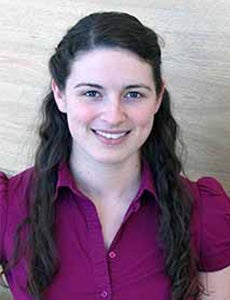 Melanie Chanona worked at the University of Waterloo in the Faculty of Science as a research assistant in Professor Robert Mann's lab. Within the first two months, she found evidence supporting a long-standing theory related to the nature of certain types of black holes. She also used novel calculation techniques to express fundamental properties of the universe in a more elegant way than has been done before. In addition, she has applied these techniques in examining real-world situations such as the heating of Jupiter's moons and the gradual slowing down of the Earth's rotation. Chanona won first prize in the best student presentation competition at the Canadian Association of Physicists Congress, where she competed against more than 100 graduate-level candidates. She won best presentation in the mathematical and theoretical physics division at the Canadian Undergraduates Physics Conference. She volunteered in Vietnam with orphans of victims of Agent Orange, and worked with psychiatric patients in a rehab program in Argentina.
Melanie Chanona worked at the University of Waterloo in the Faculty of Science as a research assistant in Professor Robert Mann's lab. Within the first two months, she found evidence supporting a long-standing theory related to the nature of certain types of black holes. She also used novel calculation techniques to express fundamental properties of the universe in a more elegant way than has been done before. In addition, she has applied these techniques in examining real-world situations such as the heating of Jupiter's moons and the gradual slowing down of the Earth's rotation. Chanona won first prize in the best student presentation competition at the Canadian Association of Physicists Congress, where she competed against more than 100 graduate-level candidates. She won best presentation in the mathematical and theoretical physics division at the Canadian Undergraduates Physics Conference. She volunteered in Vietnam with orphans of victims of Agent Orange, and worked with psychiatric patients in a rehab program in Argentina.
Sorina Chiorean (Faculty of Science, Biochemistry)
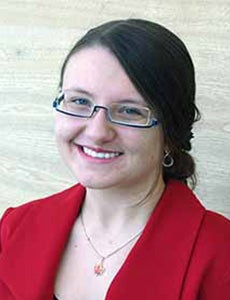 Sorina Chiorean worked as a field and lab intern with Environment Canada. Her main duty was to learn and perform biological tests involving radioactivity and immunology on collected animal samples. She performed research helped to optimize the current method, which will help to lower the cost and time associated with running the tests. She helped catch, label and record information on fish species found near Fort McMurray for an upcoming report that will evaluate the impact of the oil industry on the environment.
Sorina Chiorean worked as a field and lab intern with Environment Canada. Her main duty was to learn and perform biological tests involving radioactivity and immunology on collected animal samples. She performed research helped to optimize the current method, which will help to lower the cost and time associated with running the tests. She helped catch, label and record information on fish species found near Fort McMurray for an upcoming report that will evaluate the impact of the oil industry on the environment.
Akash Kapoor (Faculty of Arts, Accounting and Financial Management)
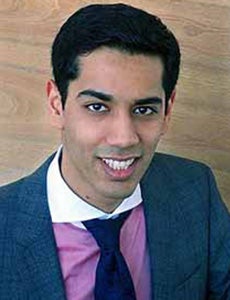 Akash Kapoor worked at Price Waterhouse Coopers for his last work term. He taught himself the public practice of auditing and excelled almost immediately. Kapoor designed a tool to increase auditing efficiency by 2 per cent, reducing the time spent during an audit engagement by more than 6,500 hours. He plans and leads tax preparation presentations as a volunteer with the Institute of Chartered Accountants of Ontario tax clinic, and administers websites for several UWaterloo student clubs and start-ups, and hosts academic and mentorship sessions. He received outstanding evaluations on each of his last three work terms. This is the second time his Faculty has honoured him as its co-op student of the year.
Akash Kapoor worked at Price Waterhouse Coopers for his last work term. He taught himself the public practice of auditing and excelled almost immediately. Kapoor designed a tool to increase auditing efficiency by 2 per cent, reducing the time spent during an audit engagement by more than 6,500 hours. He plans and leads tax preparation presentations as a volunteer with the Institute of Chartered Accountants of Ontario tax clinic, and administers websites for several UWaterloo student clubs and start-ups, and hosts academic and mentorship sessions. He received outstanding evaluations on each of his last three work terms. This is the second time his Faculty has honoured him as its co-op student of the year.
Perakaa Sethukavalan (Faculty of Applied Health Sciences, Health Studies)
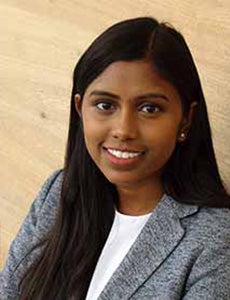 Perakaa Sethukavalan worked as a clinical research assistant at Sunnybrook Hospital. Her passion for prostate cancer research motivated her to design effective studies, receive ethics board approval, and collect and analyze the data and publish the results. She is first author on two of the four articles and of six of nine abstracts she has published. Sethukavalan presented at the 2013 American Society of Therapeutic Radiology and Oncology (ASTRO), and at the 2013 Annual Scientific Meeting of the Canadian Association of Radiation Oncology (CARO), and a poster discussion at the 2013 European Cancer Congress. She published that stereotactic radiation saves cancer patients almost $2,000 in out-of-pocket costs, and showed that a rapid diagnosis prostate centre cut wait times from suspicion to treatment by two months on average.
Perakaa Sethukavalan worked as a clinical research assistant at Sunnybrook Hospital. Her passion for prostate cancer research motivated her to design effective studies, receive ethics board approval, and collect and analyze the data and publish the results. She is first author on two of the four articles and of six of nine abstracts she has published. Sethukavalan presented at the 2013 American Society of Therapeutic Radiology and Oncology (ASTRO), and at the 2013 Annual Scientific Meeting of the Canadian Association of Radiation Oncology (CARO), and a poster discussion at the 2013 European Cancer Congress. She published that stereotactic radiation saves cancer patients almost $2,000 in out-of-pocket costs, and showed that a rapid diagnosis prostate centre cut wait times from suspicion to treatment by two months on average.
Natalie Sham (Faculty of Environment, School of Planning)
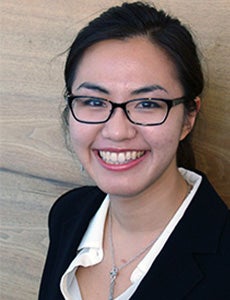 Natalie Sham worked at the UN-HABITAT headquarters in Nairobi, Kenya. She increased the agency’s knowledge on the global state of the existing formal housing by implementing an original idea to develop a Sustainable Housing Rehabilitation Index (SHRI). Sham used multivariate statistics to measure the differences between countries with regard to the state of housing to be rehabilitated, based on the four pillars of sustainability. She published the paper, Sustainable Housing Rehabilitation for Inclusive Cities, and presented it during a conference in Melbourne, Australia hosted by RMIT University and the UN Compact Cities Program. The prestigious Global Cities Review published the paper in December.
Natalie Sham worked at the UN-HABITAT headquarters in Nairobi, Kenya. She increased the agency’s knowledge on the global state of the existing formal housing by implementing an original idea to develop a Sustainable Housing Rehabilitation Index (SHRI). Sham used multivariate statistics to measure the differences between countries with regard to the state of housing to be rehabilitated, based on the four pillars of sustainability. She published the paper, Sustainable Housing Rehabilitation for Inclusive Cities, and presented it during a conference in Melbourne, Australia hosted by RMIT University and the UN Compact Cities Program. The prestigious Global Cities Review published the paper in December.
Waterloo offered its first co-op program in 1957 and is now home to the largest co-operative education program in the world. There are more than 18,000 co-op students at Waterloo.
The University will honour the following students at a ceremony on Thursday, March 20 in room 2218 of the William M. Tatham Centre at 1 p.m.

Read more
Here are the people and events behind some of this year’s most compelling Waterloo stories

Read more
Meet five exceptional Waterloo graduate students crossing the convocation stage as Class of 2025 valedictorians

Read more
As we prepare to celebrate Fall 2025 convocation this week, I would like to extend my heartfelt congratulations to our class of 2025.
The University of Waterloo acknowledges that much of our work takes place on the traditional territory of the Neutral, Anishinaabeg, and Haudenosaunee peoples. Our main campus is situated on the Haldimand Tract, the land granted to the Six Nations that includes six miles on each side of the Grand River. Our active work toward reconciliation takes place across our campuses through research, learning, teaching, and community building, and is co-ordinated within the Office of Indigenous Relations.